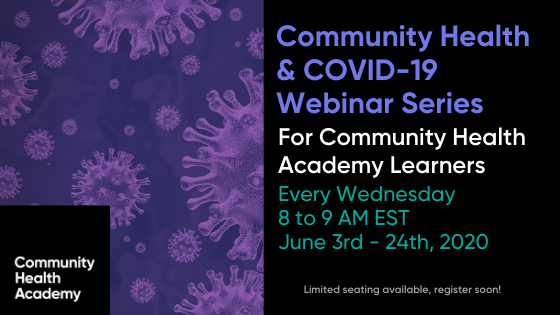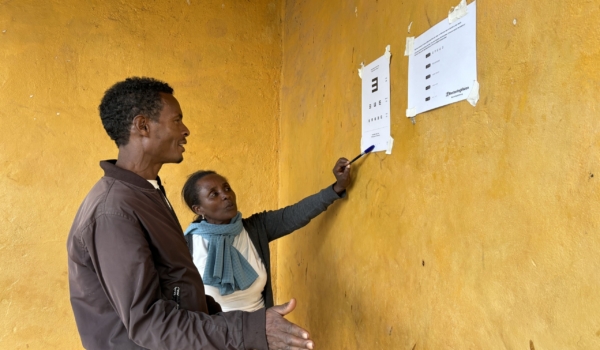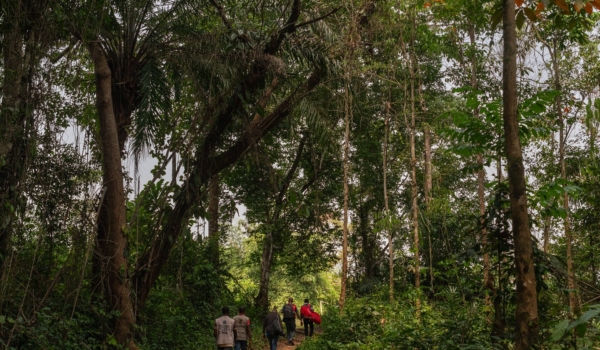By Taylor Hendricks and Naureen Syed
In response to an outpouring of requests from learners in the Community Health Academy’s first leadership course, Strengthening Community Health Worker Programs, we launched a COVID-19 webinar series to highlight on-the-ground expertise and experiences from different parts of the world. With support from community health experts from Brazil, Cameroon, Liberia, Ethiopia, Malawi, Nepal, Uganda, and the United States, we curated a series of webinars for our community of 27,000+ learners focused on the intersection of community health and the COVID-19 pandemic.
Watch: Introduction to Community Health
“How do you know that you have a strong community health worker program? You look for impact.” Dr. Raj Panjabi, moderator
Panelists from Liberia and Ethiopia shared their experiences and perspectives during this introductory discussion moderated by Last Mile Health CEO Dr. Raj Panjabi on community health and community health worker programs. He was joined by Last Mile Health Liberia team members Diana Dennis, a Quality Assurance Officer, and Marion Subah, Country Director, who elevated the day-to-day role of community health workers and what is required to sustain national programs, including a focus on skills, supervision, salary, and supplies for community health workers. Additionally, the Academy’s Abraham Zerihun Megentta shared background information on Ethiopia’s Health Extension Worker Program and described what made the program successful, including compensating community health workers for their life-saving work. Abraham also shared how the community health workforce is pivoting to COVID-19 response as cases grow in the country, including using a new mobile application created by the Ministry of Health with support from the Academy.
Watch: Shifting the Frontline: Community Health in COVID-19 Response Efforts
“Outbreaks often begin and end in communities.” Siobhan Kelley, moderator
Although COVID-19 is affecting all countries, it disproportionally affects the most vulnerable. In this webinar, moderated by Last Mile Health’s Deputy Director of Communications Siobhan Kelley, panelists from Uganda, Malawi, and Liberia discussed shifting the frontline of the COVID-19 response from hospitals to communities. Panelist Gahwarkpa Sarwah from Last Mile Health’s team in Liberia joined from remote Rivercess County to highlight how the country’s investment in community health workers during the Ebola outbreak created a foundation for the COVID-19 response today, which is supporting health workers to prevent, detect, and respond to the disease. The Academy’s Kenneth Mugumya, speaking from Kampala, Uganda, shared how the Ugandan Ministry of Health is increasing their investments in community health by leveraging technology to ensure timely information and training resources can be accessed in real-time. Ndasowa Chitule from Last Mile Health’s Malawi team elevated major issues community health workers are experiencing on the frontlines, including the lack of PPE and adequate risk compensation, and advocated for more funding globally for community health worker programs.
Watch: Gender Equity and the COVID-19 Community Health Response
“Women make up 70% of the health workforce and only 25% of health leadership.” Dr. Roopa Dhatt, moderator
Moderated by the Executive Director of Women in Global Health, Dr. Roopa Dhatt, panelists from the United States (Dr. Alfonso Rosales), Cameroon (Dr. Nicole Mbarga), and Liberia (Savior Mendin, RN) provided information on the gendered impact of COVID-19. They elevated the effects of the pandemic on women and children, including lack of access to essential healthcare like reproductive and maternal care and the increased burden of unpaid labor including caregiving. The panelists noted an alarming increase in gender-based violence reported globally, and discussed various approaches to support survivors of domestic, sexual, and gender-based violence at the program or country level. They also cited the importance of understanding the lived realities of women and children both during and after the pandemic, including prioritizing gender-disaggregated data and reporting. Ultimately, the panelists collectively pointed to the need to include more women in decision-making to ensure response and recovery efforts are representative, relevant, and effective.
Watch: Sharing Insights from National Responses to COVID-19
“[COVID-19] is a huge problem, it’s a global problem, but we need to build the local responses because this is not something that is going to be over in the next two weeks.” Dr. Camila Giugliani, panelist
In this webinar, moderated by Last Mile Health’s Country Engagement Director Mallika Raghavan, panelists from Brazil, Nepal, and Uganda discussed the strengths and weaknesses of their respective COVID-19 responses. Dr. Camila Giugliani from Brazil discussed the major challenges the country faces in containing the spread of the disease, which stems from misleading information from the government and an overall lack of preparedness at the country-level. SP Kalaunee from Nepal described supply chain disruptions as a major hindrance to procuring adequate medicines, supplies, and personal protective equipment for response efforts. Kenneth Mugumya from Uganda underscored the frequency of COVID-19 misinformation in communities, and the need to ensure all health workers and community members have access to correct and timely information about the disease. All panelists agreed that strong community health systems, formalized community health workforces, and collaboration between governments, local organizations, and communities are essential components of an effective and relevant COVID-19 national response.
The Community Health Academy team thanks all of the speakers, moderators, and attendees for joining this insightful series. Stay tuned for the Community Health Academy’s second webinar series that will address additional critical topics at the intersection of COVID-19 and community health.





